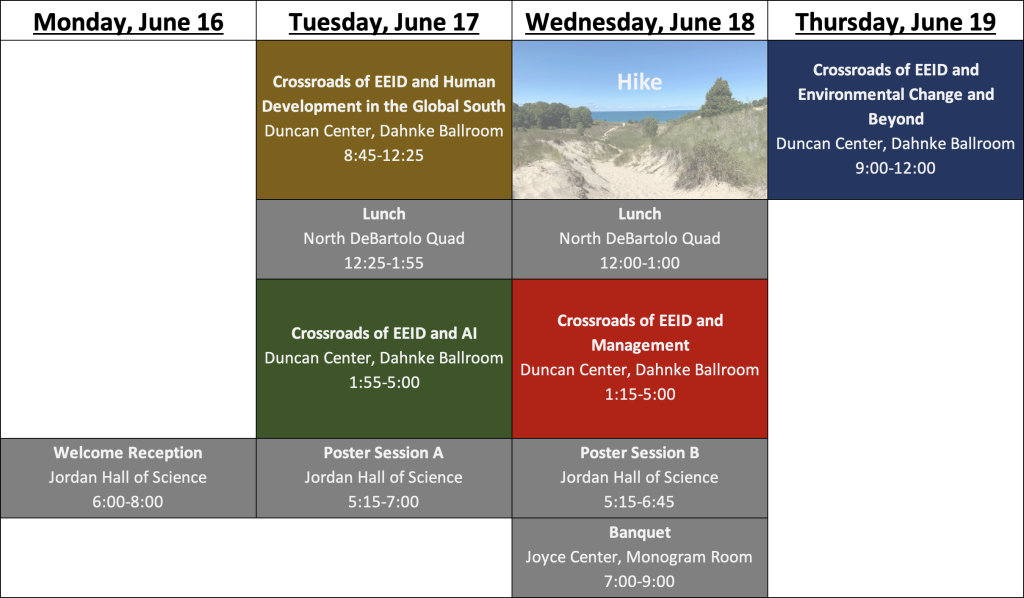
View a PDF of the schedule.
Monday, June 16
Evening Welcome Reception at Jordan Hall of Science
6 – 8 p.m. – Heavy hors d’oeuvres and open bar
Tuesday, June 17
Session on Crossroads of EEID and Human Development in the Global South
Location: Dahnke Ballroom, Duncan Student Center
Time: 8:45-12:25
Moderator: Bernard Nahlen
8:45 – 9 a.m. – Welcome (10 min)
9 – 10:10 a.m. – Invited (Zulma Cucunubá, Susan Rumisha, Nathan Lo) (70 min)
Cucunubá: “Navigating the Crossroads of Science and Policy: Lessons from Modelling Infectious Diseases in Latin America”
Rumisha: “New Directions in EEID: Geospatial Tools for Illuminating Paths to Insight”
Lo: “Modeling the control and elimination of schistosomiasis to inform policy”
10:10 – 10:25 a.m. – Discussion (15 min)
10:25 – 11 a.m. – Break (35 min)
11 a.m. – 12:10 p.m. – Invited (Eric Ochomo, Molly Doruska, Andres Garchitorena) (70 min)
Ochomo: “The Changing Vector Control Landscape and Opportunities for Novel Vector Control Tools”
Doruska: “Leveraging feedback loops: How integrating socio-economic and environmental interventions could reduce poverty”
Garchitorena: “Leveraging disease ecology to improve local control programs in low-resource settings”
12:10 – 12:25 p.m. – Discussion (15 min)
Lunch on North Side of DeBartolo Quad
12:25 – 1:55 p.m. – Lunch (1 hr 30 min)
12:45-1:30 p.m. – Optional facilitated discussion on Power Dynamics in 141 DeBartolo Hall
Session on Crossroads of EEID and Artificial Intelligence
Dahnke Ballroom, Duncan Student Center
Time: 1:55-5:00
Moderator: Cara Brook
1:55 – 2:30 p.m. – Contributed + Invited (Nicholas Kortessis, Moritz Kraemer) (35 min)
Kortessis: “Spatiotemporal heterogeneity in factors influencing disease spread can promote pathogen persistence and spread rates”
Kraemer: “Artificial intelligence for modelling infectious disease epidemics
2:30 – 2:40 p.m. – Discussion (10 min)
2:40 – 3 p.m. – Break (20 min)
3 – 3:35 p.m. – Contributed + Invited (Elijah Mehlferber, Libusha Kelly) (35 min)
Mehlferber: “Convergent cryptic specialism in a ‘generalist’ pathogen determines strain-specific infection Kelly: “Microbial diversity as a foundation for biomedical AI”
3:35 – 3:35 p.m. – Discussion (10 min)
3:45 – 4:05 p.m. – Break (20 min)
4:05 – 4:40 p.m. – Contributed + Invited (Charlie Hamilton, Christine Johnson) (35 min)
Hamilton: “An Immune System for the Planet”
Johnson: “Amplification of virus spillover risk in a time of accelerated change”
4:40 – 4:50 p.m. – Discussion (10 min)
4:50 – 5 p.m. – Announcements (10 min)
Poster Session at Jordan Hall of Science
5:15 – 7 p.m. – Poster Session | Jordan Hall of Science (1 hr 45 min)
Wednesday, June 18
7:30 – 8:30 a.m. – Meet at flag poles on South side of Notre Dame Stadium for buses to
Warren Dunes State Park
10:30 a.m. – Meet at the South entrance of Jordan Hall of Science for a campus hike including Lake Mary, Lake Joseph, Grotto, Basilica, and Golden Dome
Lunch on Bus or North Side of DeBartolo Quad
11:30 a.m. – 12:00 p.m. – Board buses for return from Warren Dunes State Park to Notre Dame
– Box lunches will be available to eat on the buses on the way back to Notre Dame
12:00 – 1:00 p.m. – Box lunches available on the North side of DeBartolo Quad (1 hr 30 min)
Session on Crossroads of EEID and Management
Dahnke Ballroom, Duncan Student Center
Time: 1:15-5:00
Moderators: Jen Owen, Bob Woods
1:15 – 1:40 p.m. – Invited (Marty Krkosek) (25 min)
Krkosek: “Disease ecology and conservation of salmon in British Columbia”
1:40-2:05 p.m. – Contributed (Michael Metzger, Marie Lilly) (25 min)
Metzger: “Transmissible cancer in bivalves: a recently identified and emerging infectious disease”
Lilly: “Functional connectivity for white-tailed deer drives the distribution of tick-borne pathogens in a highly urbanized setting”
2:05 – 2:30 p.m. – Invited (Felicia Keesing) (25 min)
Keesing: “The Tick Project: Testing environmental interventions to prevent tick-borne diseases””
2:30 – 2:45 p.m. – Discussion (15 min)
2:45 – 3:15 p.m. – Break (30 min)
3:15 – 3:40 p.m. – Invited (Adam Lauring) (25 min)
Lauring: “Transmission as a brake on RNA virus evolution”
3:40 – 4:05 p.m. – Contributed (Marcos Vieira, Ariel Greiner) (25 min)
Vieira: “Vaccination history shapes influenza vaccine responses in a randomized placebo-controlled trial: Results from the DRIVE-I study”
Greiner: “Detection of High Risk Outbreak Sources is Important for the Control of Endemic FMD”
4:05-4:30 p.m. – Invited (Karen Garrett) (25 min)
Garrett: “Translating ecological models to inform global strategies for plant health protection”
4:30 – 4:45 p.m. – Discussion (15 min)
4:45 – 5 p.m. – Announcements (15 min)
Poster Session at Jordan Hall of Science
5:15 – 6:45 p.m. – Poster Session (1 hr 30 min)
Banquet at Joyce Center Doors 1 & 2, Heritage Hall
7 p.m. – Banquet with food stations, heavy appetizers, open bar, and dancing
Thursday, June 19
Session on Crossroads of EEID and Environmental Change and Beyond
Dahnke Ballroom, Duncan Student Center
Time: 9:00-12:00
Moderators: Cat Searle, Megan Meuti
9 – 10:10 a.m. – Invited (David Civitello, Ingrid Parker, Gui Becker) (70 min)
Civitello: “Hungry hungry schistos: The resource ecology of epidemics and control”
Parker: “Host-pathogen networks in complex plant communities”
Becker: “Deforestation, Droughts, and Drivers of Disease Resistance in Tropical Wildlife”
10:10 – 10:25 a.m. – Discussion (15 min)
10:25 – 11 a.m. – Break (35 min)
11 – 11:40 a.m. – Contributed (Beth Tuschhoff, Emily Selland, Emily Ruhs) (40 min)
Tuschhoff: “Measuring heterogeneity in susceptibility using capture-mark-recapture data: a novel method applied to bank voles and Puumala hantavirus”
Selland: “Characterizing schistosomiasis transmission and the efficacy of control interventions in the face of global climate change”
Ruhs: “PFAS influences the gene expression response to viral and bacterial challenges in bald eagles (Haliaeetus leucocephalus)”
11:40 a.m. – 11:55 – Discussion (15 min)
11:55 a.m. -12 p.m. – Closing (5 min)
Thanks to our sponsors!
Kellogg Institute for International Studies, Department of Biological Sciences, Notre Dame Research, College of Science, Eck Institute for Global Health, Berthiaume Institute for Precision Health, Environmental Change Initiative, Lucy Institute for Data & Society, College of Engineering, Keough School of Global Affairs